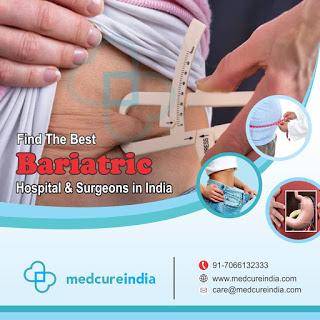India is a very popular spot for undergoing surgical procedures for obesity. Our bariatric surgery team has revolutionised the lives of many individuals all over the world.
Signs & Symptoms:Metabolic Syndrome predisposes an individual to most of the signs and symptoms associated with obesity. These include symptoms and signs of:
1) Diabetes mellitus:a) Polydipsia, polyphagia and polyuria are the classical descriptions.b) Elevated sugar levels, recurrent urinary tract infections & skin infections and poor wound healing
2) Hypertension:a) High systolic and/or diastolic blood pressureb) Recurrent headache and retro-orbital painc) Visual disturbances, retinal damage & blurring of vision
3) Dyslipidemia (Hypercholesterolemia & Hypertriglyceridemia):a) Xanthelasma are yellowish skin deposits which are cosmetically disfiguring especially on the face, usually on the eyelids.b) Xanthoma refer to large yellowish nodular deposits of fat especially within tendinous areas of the skinc) Increased waist circumference than recommended for the ethnic group or populationsd) Gynaecomastia or enlarged male breasts may affect your confidence levels.
4) Ischaemic Vascular Events (Heart Attack and Stroke):a) Chest pain, palpitations and shortness of breath

Add caption
b) Reduced exercise tolerancec) Weakness of the upper or lower limbs, deviation of the angle of the mouth,speech paralysis5) Obstructive Sleep Apnoea (OSA)& Asthma:a) Breathing difficulty and wheeze with increased work of breathingb) Snoring and sleeplessness and loss of patency of the air passage causing apnoeic episodes at night.
6) Others:a) Chronic knee pain and osteoarthritisb) Gastro-oesophageal reflux disease causes chest burns due to regurgitation of the acid from the stomachc) Fatty Liver Disease (Non- alcoholic Steatohepatitis or NASH
7) Psychosocial Symptoms:a) Depression, low self-esteem and loss of confidenceb) Increased psychological stress and healthcare costs due to recurrent hospital admissions from chronic diseasesc) Lower productivity in terms of income and education due to disabilitiesd) Chronic tiredness and loss of interest in day to day activities
Types of Disease:There are many ways in which Obesity has been categorised taking into consideration, the ethnic and regional diversities by using various parameters. Some of them include body mass index, waist to hip ratio, waist circumference, body fat percentage, and presence of disabilities or comorbidities. Edmonton Obesity Staging System (EOSS) classifies obesity into 5 stages, each with increasing risks, comorbidities, disabilities and functional limitations.Stage 0: No risk factors, symptoms or psychological or functional limitations or impairment of well beingStage 1: Subclinical risks of obesity present (impaired fasting glucose, borderline hypertension, and impaired liver enzymes), mild symptoms, psychological and functional limitations or impairment of well beingStage 2: Established chronic disease related to obesity (Type 2 Diabetes, Hypertension, Polycystic ovary, sleep apnoea, GERD), moderate limitation in activities of daily livingStage 3: Established end organ damage (heart attack, heart failure, complications of diabetes, severe osteoarthritis), significant psychological or functional limitationStage 4: Severe, potentially end stage disabilities from obesity related chronic diseases, disabling psychological or functional limitation
Treatment Procedures:A complete assessment of an individual suffering from obesity disorder is to identify the cause of obesity and managing the same. This involves a history taking, examination and a series of blood tests to see any functional disorders that persist alongside during the visit to your doctor. Any special test may be advised, considering the comorbidities or for anaesthetic fitness for surgery.
Surgical procedures for obesity are very popular these days; however, there are several alternatives to surgical procedures and can be tried depending on individual preferences. These may include agreeing on a weight loss goal and strategic planning with review at our obesity clinics.
The weight loss strategy involves proper diet and exercise, stress management with relaxation exercises and counselling, and some anti-obesity drugs . However, many of these are practically difficult and the medications can have abdominal side effects which make people adopt bariatric procedures for a permanent resolution.The surgeries are usually done laparoscopically. However, recent advances have enabled use of robotic surgery to make precise surgical manipulations with good success rates.The types of surgeries performed involve restrictive (restricts the amount of food) and malabsorptive (decreases the absorption) elements and may include:
1) Gastric banding:This is the most common restrictive procedureperformed:· A band is placed around the upper portion of the stomach (cardia)· This restricts the amount of solid food material ingested at one time, and not affecting the quantity of liquid that can be taken in at a time· May need supplements following the first year of surgeryNB: Adjustable Gastric Banding is another surgery wherein asilastic band is placed which can be adjusted by injecting saline to a port which lies beneath the skin. This requires regular clinical assessment to adjust the band as required.2) Sleeve gastrectomy: This is another restrictive surgery which is available.· Almost three-fourths of the stomach is removed and the volume that can be consumed in a meal is restricted· Gastric transit time is shortened and this hastens gastric emptying.· May require routine vitamin supplements for the first year3) Gastric bypass:Almost 50-75% of the excess weight may be lost following procedure in approximately one to one and a half years. This has both restrictive &malabsorptive mechanisms:· The stomach is divided and a small remnant is created· The small intestine is divided and re-anastomosed to the remnant of the stomach· This effectively reduces food intake as well as the absorption aiding weight loss· May require routine supplements due to impairment of absorption4) Minigastric bypass:This has both restrictive and malabsorptive elements. It is similar to the gastric bypass, except that a mini stomach is created by incomplete division of the stomach, prior to anastomosing it with the small bowel.5) Endoscopic Intragastric Balloon Surgery:A balloon is placed endoscopically into the stomach lumen and inflated. This achieves early satiety with less volume of food as; the gastric lumen is restricted by the intragastric balloon.6) Biliopancreatic diversion and other metabolic surgeries are also available.Bariatric surgery in diabetes may sometimes aid in complete reversal of sugar levels to normal, and can be considered in cases of diabetes not responding to medical therapy.Adjuvant therapies for associated ailments, if any, will also be addressed simultaneously. This may include cosmetic surgeries, surgery for gynaecomastia, liposuction and plastic surgery.
Am I a Good Candidate for Bariatric surgery?Bariatric surgeries are usually considered in cases of failure of non-surgical treatment and compatibility to undergo surgery after pre-operative counseling has been assessed.The indications for bariatric surgeries as per the American Society for Metabolic and Bariatric Surgery are:1) Obesity Class 3 (BMI >= 40)2) Obesity Class 2 (BMI: 35.0 to 39.9) with at least one obesity related comorbidity like Type 2 Diabetes, Hypertension, Sleep Apnoea, Non-alcoholic Fatty Liver disease, Osteoarthritis, Dyslipidemia, Heart disease, Gastro-oesophageal Reflux disease etc.3) Failure to achieve a sustained weight loss for a period of time in spite of various weight loss strategies.If you belong to any of these classes, you are indeed the ideal candidate for a bariatric surgery. We have a well-equipped and talented group of doctors and medical personnel who care for our patients. We employ the latest technical advancements in surgical procedures including the DaVinci robotic system for bariatric procedures. We extend our services to you and we will be glad to see you living with confidence.To Get Free Quotes & Consultation For This Treatment in India Contact Us At:
MedcureIndia Healthcare ConsultantsCall Us: +91-7066132333Email Us: [email protected]

